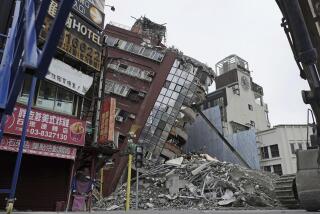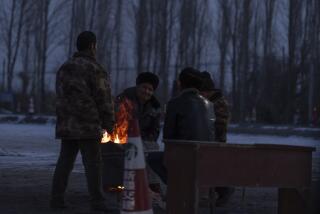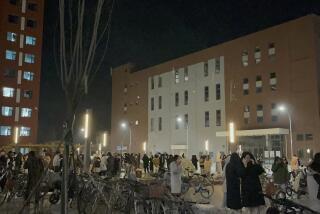China knife attack leaves 28 dead, scores injured at train station
SHANGHAI — At least 28 people died and more than 113 were injured Saturday when a group of assailants wielding large knives stormed into a railway station in southern China and apparently attacked people at random, state-run media reported.
President Xi Jinping vowed swift action to punish those responsible for the bloody attack and “suppress terrorists’ rampant momentum,” the official New China News Agency reported. The agency said separatists from the far western region of Xinjiang were behind the highly unusual and terrifying attack in Kunming, the capital of Yunnan province.
It was not immediately clear why Yunnan would be targeted or separatists responsible. Xinjiang, home to a Muslim ethnic minority called Uighurs, has witnessed a number of violent clashes in recent years, including a riot in July 2009 that left nearly 200 dead and a series of lethal clashes at police stations involving knives and homemade firebombs. But Kunming is about 1,500 miles from Xinjiang’s capital.
Authorities, though, have been worried about unrest spreading beyond Xinjiang, particularly since October, when a jeep plowed through a crowd in Tiananmen Square in Beijing and caught fire. The three occupants of the vehicle, along with two pedestrians, were killed, and about 40 people were injured. Chinese officials identified the occupants of the jeep as Uighurs and said the incident was a terrorist attack carried out by the East Turkestan Islamic Movement, a separatist group.
It was not clear how many attackers were involved in the incident Saturday in Kunming. In addition to the 28 victims of the attack, five assailants were killed, the news agency said, though others apparently remained at large as of Sunday morning.
The Kunming station erupted into bloody pandemonium about 9:30 p.m., witnesses said in accounts posted online and related to news media. Gruesome photos of the scene from a local TV news broadcast showed several people, their clothing soaked with blood, lying on a tile floor in the station and more people on the ground outside.
The bloody incident comes just before two high-profile gatherings are to be held in Beijing this week, the National People’s Congress and the Chinese People’s Political Consultative Conference. Kunming is about 1,300 miles southwest of the capital.
Two senior officials, domestic security chief Meng Jianzhu and the minister of public security, Guo Shengkun, were dispatched to Yunnan.
The Oriental Morning Post cited a witness, Wang Dinggeng, as saying that he was resting outside the railway station shortly after 9 p.m. when he saw two men in masks and black clothing rush into the ticketing office. About five minutes later, he heard screams.
Another person claiming to be a witness posted an account online saying that sometime after 9:24 p.m. he was waiting at the ticket counter when chaos erupted. He wrote that he saw a man in a yellow jacket and woman in black clothing carrying out the attack, and that one had a knife about 2 feet long.
It took authorities until nearly 1 a.m. to subdue all of the attackers.
Dozens of ambulances and other emergency vehicles were dispatched to the scene, authorities said. Trains bound for the station were diverted, a local TV station said.
Philip Potter, a professor at the University of Michigan who has written extensively about ethnic violence in China, said the Kunming attack appears to show a higher level of sophistication because of the number of people involved.
“Knives are low-tech, but scholars think about coordination and power projection as technological innovations. Coordination is difficult to do,’’ said Potter. “I see this as a constitution of the theme from the Tiananmen attack, though this is far more serious. The new goal is to project power and fear out of Xinjiang.”
In July 2008, Kunming was the site of two deadly bus bombings an hour apart during the morning rush hour. A video emerged shortly afterward claiming responsibility for an Islamic separatist group, which said the bombs had been planted to disrupt the upcoming Summer Olympics in Beijing. Chinese authorities dismissed the video as a hoax and blamed an unemployed Han Chinese man for the bombings.
Tommy Yang in The Times’ Beijing bureau contributed to this report.
More to Read
Start your day right
Sign up for Essential California for news, features and recommendations from the L.A. Times and beyond in your inbox six days a week.
You may occasionally receive promotional content from the Los Angeles Times.







